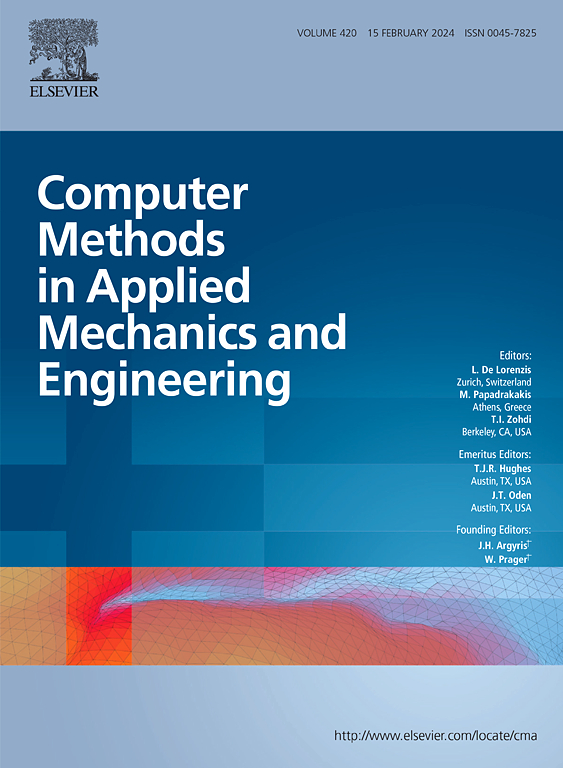Diff-FlowFSI:一个gpu优化的可微分CFD平台,用于高保真湍流和FSI模拟
IF 7.3
1区 工程技术
Q1 ENGINEERING, MULTIDISCIPLINARY
Computer Methods in Applied Mechanics and Engineering
Pub Date : 2025-10-10
DOI:10.1016/j.cma.2025.118455
引用次数: 0
摘要
湍流和流固相互作用(FSI)在科学和工程应用中无处不在,但由于其强非线性、多尺度相互作用和高计算需求,其准确和高效的模拟仍然是一个主要挑战。传统的CFD求解器虽然有效,但在逆建模、优化和数据同化等任务上存在可扩展性和适应性问题。机器学习(ML)的最新进展激发了混合建模方法的灵感,这些方法将神经网络与基于物理的求解器集成在一起,以增强通用性并捕获未解决的动态。然而,实现这种集成需要求解器不仅在物理上准确,而且可微分和gpu效率高。在这项工作中,我们介绍了Diff-FlowFSI,这是一个gpu加速,完全可微分的CFD平台,专为高保真湍流和FSI模拟而设计。在JAX中实现的diffi - flowfsi具有矢量化有限体积求解器和浸入边界法相结合的特点,可以处理复杂的几何形状和流固耦合。该平台支持gpu支持的快进模拟,支持基于梯度的逆问题的自动微分,并与深度学习组件无缝集成,用于混合神经- cfd建模。我们通过一系列基准湍流和FSI问题验证了Diff-FlowFSI,展示了其在物理和机器学习交叉领域加速科学计算的能力。本文章由计算机程序翻译,如有差异,请以英文原文为准。
Diff-FlowFSI: A GPU-optimized differentiable CFD platform for high-fidelity turbulence and FSI simulations
Turbulent flows and fluid-structure interactions (FSI) are ubiquitous in scientific and engineering applications, but their accurate and efficient simulation remains a major challenge due to strong nonlinearities, multiscale interactions, and high computational demands. Traditional CFD solvers, though effective, struggle with scalability and adaptability for tasks such as inverse modeling, optimization, and data assimilation. Recent advances in machine learning (ML) have inspired hybrid modeling approaches that integrate neural networks with physics-based solvers to enhance generality and capture unresolved dynamics. However, realizing this integration requires solvers that are not only physically accurate but also differentiable and GPU-efficient. In this work, we introduce Diff-FlowFSI, a GPU-accelerated, fully differentiable CFD platform designed for high-fidelity turbulence and FSI simulations. Implemented in JAX, Diff-FlowFSI features a vectorized finite volume solver combined with the immersed boundary method to handle complex geometries and fluid-structure coupling. The platform enables GPU-enabled fast forward simulations, supports automatic differentiation for gradient-based inverse problems, and integrates seamlessly with deep learning components for hybrid neural-CFD modeling. We validate Diff-FlowFSI across a series of benchmark turbulence and FSI problems, demonstrating its capability to accelerate scientific computing at the intersection of physics and machine learning.
求助全文
通过发布文献求助,成功后即可免费获取论文全文。
去求助
来源期刊
CiteScore
12.70
自引率
15.30%
发文量
719
审稿时长
44 days
期刊介绍:
Computer Methods in Applied Mechanics and Engineering stands as a cornerstone in the realm of computational science and engineering. With a history spanning over five decades, the journal has been a key platform for disseminating papers on advanced mathematical modeling and numerical solutions. Interdisciplinary in nature, these contributions encompass mechanics, mathematics, computer science, and various scientific disciplines. The journal welcomes a broad range of computational methods addressing the simulation, analysis, and design of complex physical problems, making it a vital resource for researchers in the field.

 求助内容:
求助内容: 应助结果提醒方式:
应助结果提醒方式:


